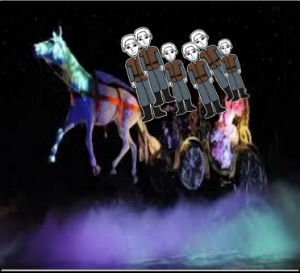Shakespeare’s Logical Fallacies
In “The Tragedy of Julius Caesar” the author uses many logical appeals to convince the author to believe something. One of the appeals he uses is the Snob Appeal. In line 90-91 Shakespeare says “I know that virtue to be in you, Brutus, as well as I know you outward favor.” Cassius is trying to appeal to Brutus by making him feel superior over everyone. In the same act he also uses the ad hominem fallacy. In line 121-125 he says “he had a fever when in Spain and when fit was on him, i did mark how he did shake. ‘Tis true, this God did shake.” Cassius says that Caesar is unfit and weak for king by attacking Caesar himself rather than what he has done as king. Another fallacy he uses is The slippery slope fallacy. He says “And this man is now become a god, and cassius is a wretched creature and must bend his body if Caesar careselly but nod to him.” in lines 118-120. Cassius feels that because Caesar is a God, the only outcome is that Cassius and the others will feel miserable for the rest of their life. He also uses the Strawman fallacy by saying “Therefore good Brutus, be prepared to hear. And since you know you cannot see yourself, so well as by reflection, I, your glass will modestly discover to yourself, That yourself which you yet know not of.” in line 72-76. Cassius asks Brutus if he can see himself. Brutus responds that he cannot see himself. He means this literally, as in he cannot see his own face. Cassius then changes the meaning of his statement by implying that Brutus cannot see his own thoughts. Cassius then offers to reveal to him that which he does not yet know. To finalize my analyzation, Shakespeare uses the loaded question fallacy. To prove this, in line 49-51 he says “Brutus and Caesar what should be in that Caesar? Why should that name be sounded more than yours?” Cassius compares Brutus and Caesar and asks what is so special about Caesar that his name holds more power than Brutus’s. Shakespeare shows many examples of how he can use logical fallacies to spice up his writings. Also to add some flavor to the readers passage.









 But if this I do not get a valentine I usually get my sister and my mom gifts (best son award). My dad usually gets them something if I don’t. And my brother usually just gets his class candy and things since he is still young.
But if this I do not get a valentine I usually get my sister and my mom gifts (best son award). My dad usually gets them something if I don’t. And my brother usually just gets his class candy and things since he is still young.
 me off strong and we went out of the first quarter winning. We were all pumped up having a great time. Half time came and they caught up but we were still winning. Coach Antwon gave us a speech saying keep playing well and we will win this game.
me off strong and we went out of the first quarter winning. We were all pumped up having a great time. Half time came and they caught up but we were still winning. Coach Antwon gave us a speech saying keep playing well and we will win this game.